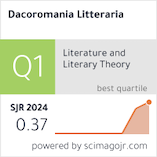LITERARY RECEPTION THEORIES: A REVIEW
(Abstract)
The interest in a contextualizing approach to literature is getting shape over the 1960s as a means of overcoming the dominant textual (and aesthetical) methodology or emphasis, of breaking away “from the formalist and New Critical emphasis on the autonomy of ‘the text itself’ toward a recognition (or a re- recognition) of the relevance of context, whether the latter be defined in terms of historical, cultural, ideological, or psychoanalytic categories.” (Suleiman – Crosman 1980: 5). In this paper I will consider exclusively the dynamics of reception theories between roughly 1970-1990. The reasons for which it seemed necessary to re-open this ‘case’ are twofold: firstly, to my knowledge Romanian literary culture still lacks a detailed introduction to the so-called ‘golden age’ of reception studies, an introduction that would cover both historical and theoretical aspects; secondly, and more important in my view: as we shall see in the final section of this paper, Romanian literary research, by its nature very prone, even obsessed to synchronize itself with Western theory, was not quite eager to absorb reception studies, especially in their German versions. After 1990, missing out certain stages suddenly brought our literary research to other topics of interest, very political ones, as for instance, cultural, gender, or postcolonial studies, etc. I strongly believe that a reassessment of this kind is still useful and necessary.
Keywords: Literary theory (1970-1990), Sociology of literature, Literary reception theories, Constance School, the study of reception in România (1970-1990).


